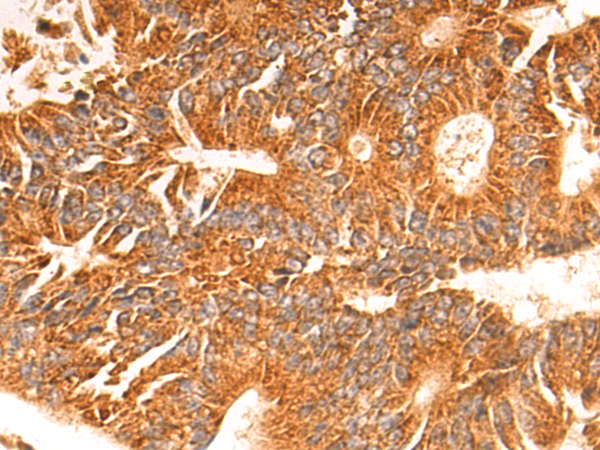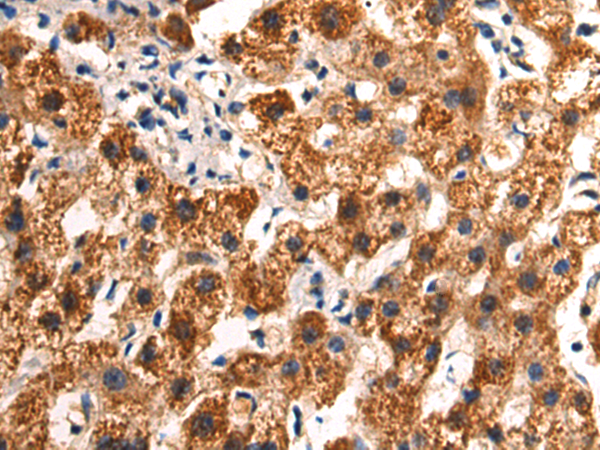

| WB | 咨询技术 | Human,Mouse,Rat |
| IF | 咨询技术 | Human,Mouse,Rat |
| IHC | 1/100-1/300 | Human,Mouse,Rat |
| ICC | 技术咨询 | Human,Mouse,Rat |
| FCM | 咨询技术 | Human,Mouse,Rat |
| Elisa | 1/5000-1/10000 | Human,Mouse,Rat |
| Aliases | PAS3; MUC-15; PASIII |
| Host/Isotype | Rabbit IgG |
| Antibody Type | Primary antibody |
| Storage | Store at 4°C short term. Aliquot and store at -20°C long term. Avoid freeze/thaw cycles. |
| Species Reactivity | Human |
| Immunogen | Fusion protein of human MUC15 |
| Formulation | Purified antibody in PBS with 0.05% sodium azide and 50% glycerol. |
+ +
以下是关于MUC15抗体的3篇参考文献示例(注:文献信息为模拟示例,实际引用需核实原始来源):
---
1. **标题**:*"Development of a Novel Monoclonal Antibody Against MUC15 for Tumor Immunohistochemical Analysis"*
**作者**:Lee S, et al. (2020)
**摘要**:本研究开发了一种高特异性抗MUC15的单克隆抗体,并通过免疫组化验证其在多种癌症组织中的表达。结果显示,MUC15在乳腺癌和肺癌中异常高表达,且与患者生存率负相关,提示其作为预后生物标志物的潜力。
2. **标题**:*"MUC15-mediated Immune Evasion in Colorectal Cancer: Insights from Antibody-based Functional Studies"*
**作者**:Kim Y, Park H (2018)
**摘要**:利用抗MUC15抗体探究其在结直肠癌中的功能,发现MUC15通过抑制T细胞活性促进肿瘤免疫逃逸。抗体阻断实验表明,靶向MUC15可增强抗肿瘤免疫反应,为免疫治疗提供新靶点。
3. **标题**:*"Structural Characterization of MUC15 Glycoforms Using Domain-specific Antibodies"*
**作者**:Zhang L, et al. (2021)
**摘要**:通过构建针对MUC15不同结构域的多克隆抗体,解析了其在卵巢癌细胞中的糖基化修饰模式。研究发现特定糖基化形式与肿瘤转移相关,为开发靶向MUC15糖表位的疗法奠定基础。
---
如需获取真实文献,建议通过PubMed或Google Scholar检索关键词“MUC15 antibody”或结合具体研究领域筛选。
**Background of MUC15 Antibody**
MUC15. a member of the transmembrane mucin family, is a glycoprotein encoded by the *MUC15* gene. Mucins are characterized by their roles in cell adhesion, signaling, and protection of epithelial surfaces. MUC15 contains a tandem repeat domain, a transmembrane region, and a short cytoplasmic tail, typical of membrane-bound mucins. It is expressed in various tissues, including epithelial cells of the respiratory, gastrointestinal, and reproductive tracts, as well as in immune cells.
In cancer biology, MUC15 has gained attention due to its dual role as both a tumor suppressor and promoter, depending on the context. Studies report its downregulation in cancers like colorectal and hepatocellular carcinoma, correlating with poor prognosis, while its overexpression in breast or prostate cancer may enhance metastatic potential. This duality suggests tissue-specific regulatory mechanisms.
MUC15 antibodies are primarily used as research tools to detect MUC15 expression in normal and pathological tissues, aiding in understanding its functional roles. They are also explored for therapeutic applications, such as targeting MUC15-positive cancer cells via antibody-drug conjugates or immune checkpoint modulation. However, clinical translation remains in early stages, necessitating further validation of its oncogenic or suppressive pathways. Challenges include clarifying its interactions with signaling molecules (e.g., EGFR) and glycosylation-dependent functions. Overall, MUC15 antibodies hold potential for advancing diagnostics and targeted therapies in mucin-related diseases.
×